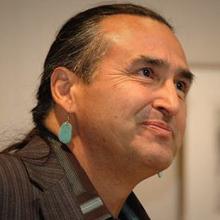Indigenous American leaders speak out against the Washington NFL team’s mascot.
American Indians
I'VE NEVER FELT as powerful and proud of my community as I was while walking down the middle of Franklin Avenue in Minneapolis on a cold evening in November with hundreds of other Native activists and allies. We were marching from the heart of the Minneapolis American Indian community to the Hubert H. Humphrey Metrodome to speak out against the Washington Redsk*ns mascot.
Hundreds of American Indians and allies rallied outside the Metrodome to demand that Dan Snyder, owner of the Washington professional football team, change the team’s name and mascot in spite of Snyder’s dissent. The owner’s unwavering commitment to keeping the Redsk*ns name became evident when earlier this year he stated, “We’ll never change the name. It’s simple. NEVER. You can use caps.”
Standing among supporters and friends, I looked on as the community joined together in drumming, dancing, and singing, with American Indian Movement co-founder Clyde Bellecourt serving as the rally’s emcee. Several local elected leaders addressed the crowd, including U.S. Rep. Betty McCollum, co-chair of the Congressional Native American Caucus, and the mayor-elect of Minneapolis, Betsy Hodges, days after winning her election for mayor. The two joined an avalanche of elected leaders calling on Snyder and NFL Commissioner Roger Goodell to change the team’s name.
More than 20 years prior, another protest had been held at the Metrodome for Super Bowl XXVI, a game between the Washington Redsk*ns and the Buffalo Bills. That protest included Clyde Bellecourt’s brother, Vernon, leading the charge with Sen. Paul Wellstone, a friend and champion of the American Indian community. Two decades later, the conversation has changed and momentum is on our side. Even President Barack Obama joined the cause in saying, “I’ve got to say, if I were the owner of the team and I knew that there was a name of my team—even if it had a storied history—that was offending a sizeable group of people, I’d think about changing it.”
The Native American narrative remains largely unknown in U.S. majority culture. It is glaringly absent in most school curriculums, and remains unheard in modern dominant politics. One crucial stream of Native culture I’ve recently come to learn about is the destructive legacy of Christian-run Indian boarding schools.
What began with genuinely good intentions (in those days, “European” norms were viewed as superior, “sameness” seemed like a good idea, and the threat of legitimate genocide lingered over tribes) rapidly deteriorated, with Christian boarding schools becoming institutions of forced assimilation and abuse.
Beginning in the 1800s and lasting into the 20th century, Native children were forcibly removed from their families and sent to live in boarding schools. Finding the task of “civilizing” Native adults beyond its ability, the federal government delegated the task of “normalization” to churches, which could educate, or, inculcate, children from a young age.
It was one week ago that I received the email I had been dreading. On Feb. 6, 2013, while in Washington, D.C., for the National Prayer Breakfast, Richard Twiss suffered a major heart attack. He remained in a hospital in the D.C. area for several days as friends and family rushed to his side. But on Feb. 9, at the age of 58, Taoyate Obnajin, he Stands with his People, crossed over to meet the Creator. He is survived by his wife Katherine and his four sons Andrew, Philip, Ian, and Daniel.
If you ever had the privilege of meeting Richard Twiss, chances are he invited you somewhere. Richard was an incredible host. I remember last summer I attended a symposium for the North American Institute for Indigenous Theological Studies, of which Richard was a board member. No sooner had I walked through the door when I was greeted by Richard and asked if I would like to join their drum circle up front to start the next session. I felt extremely honored by this invitation and gladly accepted. I am not a trained theologian nor am I a prolific powwow drummer, but this small gesture immediately made me feel at home and communicated that I was welcome there and was given a voice should I have something to contribute.
Richard was involved in many conversations. As a follower of Jesus, president and co-founder of Wi


